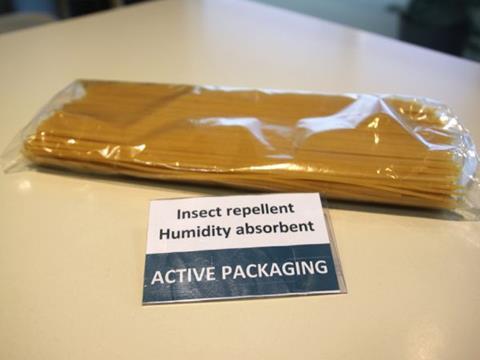
The Packaging, Transport and Logistics Research Centre (ITENE) has developed an active packaging that repels insects and absorbs moisture that protects and preserves dried food products from pantry pest infestations.
This is the result of a collaborative project with the companies Plásticos del Segura and Pastas Alimenticias Romero with funding from the Spanish Ministry of Economy and Competitiveness.
This initiative, known as Pasta-Activepack and carried out between 2015 and 2018, intends to meet the needs of the pasta and dried packaged food industries to eradicate insect pests that appear in pasta products packaged for long periods of time in pantries or warehouses, which causes substantial losses at the point of sale.
During the project's execution, ITENE has developed new materials that are based on the application of coatings with the capacity to repel insects and absorb moisture on flexible packaging materials. This solution is applicable during flexography and gravure printing processes and results in packaging materials with adequate transparency and good adhesive properties between the coating and the substrate.
The industrial tests carried out during the project were satisfactory, to such an extent that modifying the print settings on the production lines for current flexible containers or in the packaging stages for pasta was not required.
Likewise, ITENE has developed and validated methods to evaluate the repellent properties of these new materials. The objective of these trials is to assess the behaviour of the insects over time after being exposed to those materials, which makes it possible to determine whether they are not effective or are attractive or repellent, as has finally been demonstrated.
Therefore, the performance results show a clear repellent effect, with reductions in insect contamination of 80 to 90% compared to other packaging materials used today. Secondly, the moisture-absorbing qualities keep the dried pasta product in a better state of conservation during the product's shelf life.
The project involved Plásticos del Segura, from Murcia, which addressed the industrial scale-up of the active packaging solution, allowing it to innovate in new packaging solutions with high added value, alongside Pastas Alimenticias Romero, from Zaragoza, which validated the new active packaging with its own products and evaluated the high quality and safety of the packaging developed. The Spanish research centreITENE, for its part, acted as a research and development centre for new active packaging technology.
The Pasta-Activepack project is part of the State R+D+I Programme of the Ministry of Economy and Competitiveness, focused on the Challenges of Society within the framework of the State Plan for Scientific and Technical Research and Innovation with reference number RTC-2015-4098-2.













